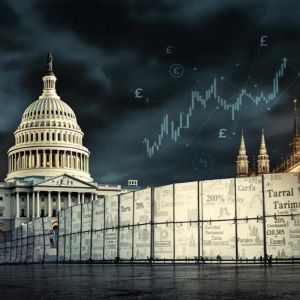Trump Tariffs: The Looming Shockwave of 15-20% Minimum on EU Goods
7 min read
BitcoinWorld Trump Tariffs: The Looming Shockwave of 15-20% Minimum on EU Goods The world of finance is always on edge, reacting to geopolitical shifts and economic pronouncements. For those deeply entrenched in the dynamic realm of cryptocurrency, understanding these broader market forces is not just an advantage, it’s a necessity. A recent development that has sent ripples across traditional markets and warrants close attention from crypto enthusiasts is the potential return of significant Trump tariffs . Imagine a scenario where the cost of goods from one of the world’s largest economic blocs suddenly jumps by 15-20%. This isn’t just a hypothetical; it’s a very real proposal from former U.S. President Donald Trump, aiming to impose a minimum tariff on all goods imported from the European Union. What Are These Proposed Trump Tariffs? According to insights shared by Walter Bloomberg, citing the Financial Times on X, former U.S. President Donald Trump is reportedly considering a sweeping economic maneuver: a 15–20% minimum tariff on all goods imported from the European Union. This isn’t a small adjustment; it’s a substantial increase that could fundamentally reshape trade relations between two of the world’s largest economic powers. But what exactly does this mean for consumers, businesses, and the broader financial landscape? Let’s break it down. What is a Tariff? A tax imposed by one country on goods and services imported from another country. Tariffs increase the price of imported goods and services, making them less competitive than domestically produced goods and services. The Specifics: A blanket 15-20% minimum tariff means that virtually every product, from luxury cars to agricultural produce, crossing the Atlantic from the EU to the U.S. would become significantly more expensive. The Rationale (from a protectionist perspective): Proponents argue that such tariffs protect domestic industries, encourage local production, and potentially reduce trade deficits. However, critics often point to the potential for retaliatory measures and increased consumer costs, making these Trump tariffs a contentious issue. How Could EU Trade Policy Respond? The European Union, a powerful economic bloc with its own complex web of trade agreements and policies, would undoubtedly face immense pressure to respond to such aggressive EU trade policy shifts. History shows that when one major economy imposes tariffs, others often retaliate, leading to a tit-for-tat escalation that can harm global commerce. What are the likely scenarios for the EU’s reaction? Retaliatory Tariffs: The most immediate and probable response. The EU could impose its own tariffs on U.S. goods, making American products more expensive for European consumers. This could affect sectors like agriculture, technology, and automotive. WTO Challenges: The EU might challenge the tariffs through the World Trade Organization (WTO), arguing they violate international trade rules. However, WTO dispute resolution can be a lengthy process, and its effectiveness has been debated, especially in recent years. Strategic Alliances: The EU might seek to strengthen trade ties with other nations or blocs to diversify its markets and reduce reliance on the U.S. Internal Economic Strain: EU member states, particularly those heavily reliant on exports to the U.S., could face significant economic strain, leading to job losses and reduced economic growth. Understanding the Global Economic Impact The ripple effects of such a significant trade policy change would extend far beyond the immediate U.S.-EU relationship, causing a substantial global economic impact . In an interconnected world, trade wars are rarely contained. The proposed tariffs could trigger a cascade of consequences that affect supply chains, inflation, and economic growth worldwide. Supply Chain Disruptions: Many global companies have complex supply chains that span multiple countries. Tariffs could force businesses to rethink their manufacturing and sourcing strategies, leading to higher costs and potential shortages. Inflationary Pressures: Increased import costs often get passed on to consumers, leading to higher prices for goods. This could fuel inflation, impacting purchasing power and central bank policies. Reduced Global Trade Volumes: A protracted trade dispute between two major economies could lead to a general slowdown in global trade, hurting export-dependent nations and overall economic expansion. Investor Uncertainty: Businesses and investors thrive on predictability. The uncertainty created by trade wars can lead to reduced investment, market volatility, and a flight to perceived safe-haven assets, all contributing to a negative global economic impact . The Ripple Effect: Crypto Market Volatility While direct tariffs don’t apply to digital assets, the cryptocurrency market is not immune to macroeconomic shifts. In fact, it often reacts sharply to significant changes in traditional financial landscapes. The prospect of renewed trade tensions and their broader economic consequences could directly influence crypto market volatility . How might this play out for your digital assets? Risk-Off Sentiment: When traditional markets face uncertainty (like a trade war), investors often move away from riskier assets, including cryptocurrencies, towards perceived safer havens like gold or government bonds. This could lead to a sell-off in crypto. Dollar Strength/Weakness: Trade policies can impact currency valuations. A stronger dollar, for instance, might make dollar-denominated crypto less attractive for international buyers, while a weaker dollar could have the opposite effect. Inflation Hedge Narrative: If tariffs lead to significant inflation, some investors might turn to Bitcoin and other cryptocurrencies as a hedge against rising prices, strengthening the ‘digital gold’ narrative. However, this is not guaranteed, especially during initial periods of uncertainty and increased crypto market volatility . Increased Correlation: In times of extreme stress, crypto markets can sometimes show increased correlation with traditional equity markets, moving in tandem with major indices. A trade war could exacerbate this. Navigating Trade War Implications For investors, businesses, and indeed, anyone navigating the complex global economy, understanding the potential trade war implications is crucial. While the proposal is still a prospect, preparing for potential outcomes is a wise strategy. What actionable insights can we glean from this looming economic challenge? For Businesses: Diversify Supply Chains: Explore alternative sourcing options outside the EU to mitigate tariff risks. Review Pricing Strategies: Anticipate increased import costs and adjust pricing accordingly, or seek ways to absorb costs without passing them entirely to consumers. Lobbying Efforts: Engage with trade associations and policymakers to voice concerns and influence trade negotiations. For Investors (Traditional and Crypto): Monitor Economic Indicators: Keep a close eye on inflation rates, GDP growth, and trade balance reports. Diversify Portfolios: Consider a balanced portfolio that includes assets traditionally seen as safe havens alongside riskier investments. Stay Informed on Geopolitics: Trade policy is inherently political. Understanding the broader geopolitical landscape is key. Risk Management in Crypto: For crypto holders, this might mean adjusting position sizes, setting stop-losses, or exploring stablecoin options during periods of heightened volatility. The long-term fundamentals of projects remain important, but short-term price action can be heavily influenced by macro events and trade war implications . The prospect of significant Trump tariffs on EU goods represents a formidable challenge to global trade and economic stability. While the full scope of its impact remains to be seen, the potential for a renewed trade war carries serious implications for businesses, consumers, and financial markets worldwide, including the often-volatile cryptocurrency space. As the global economic landscape continues to evolve, driven by political rhetoric and policy decisions, staying informed and adaptable will be paramount. Whether these tariffs materialize or not, the discussion alone highlights the interconnectedness of our world and the profound influence of trade policy on every facet of our financial lives. To learn more about the latest crypto market trends, explore our article on key developments shaping Bitcoin price action. Frequently Asked Questions (FAQs) What are Trump’s proposed tariffs on EU goods? Former U.S. President Donald Trump is reportedly considering imposing a 15-20% minimum tariff on all goods imported from the European Union. This means a significant tax would be added to the cost of EU products entering the U.S. market. How would these tariffs impact the global economy? Such tariffs could lead to retaliatory measures from the EU, sparking a trade war. This could disrupt global supply chains, increase inflationary pressures due to higher import costs, reduce overall global trade volumes, and create significant uncertainty for businesses and investors worldwide, leading to a substantial global economic impact . Why is this relevant to cryptocurrency investors? While cryptocurrencies are not directly taxed by these tariffs, the broader economic instability and market uncertainty caused by a potential trade war can significantly impact crypto market volatility . Investors may adopt a “risk-off” sentiment, leading to sell-offs, or conversely, some might see certain cryptocurrencies as an inflation hedge. What are the potential responses from the European Union? The EU could respond with retaliatory tariffs on U.S. goods, making American products more expensive for European consumers. They might also challenge the tariffs through the World Trade Organization (WTO) or seek to strengthen trade alliances with other nations as part of their evolving EU trade policy . What are the “trade war implications” for businesses and investors? For businesses, implications include the need to diversify supply chains and review pricing strategies. For investors, it means monitoring economic indicators, diversifying portfolios, and understanding that geopolitical events can significantly influence market sentiment and asset prices, including cryptocurrencies, due to their inherent trade war implications . Did this article help you understand the potential impact of Trump’s proposed tariffs on the global economy and the crypto market? Share your thoughts and insights with your network! Help us spread awareness by sharing this article on your favorite social media platforms. This post Trump Tariffs: The Looming Shockwave of 15-20% Minimum on EU Goods first appeared on BitcoinWorld and is written by Editorial Team

Source: Bitcoin World



